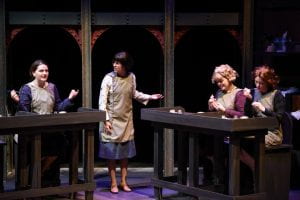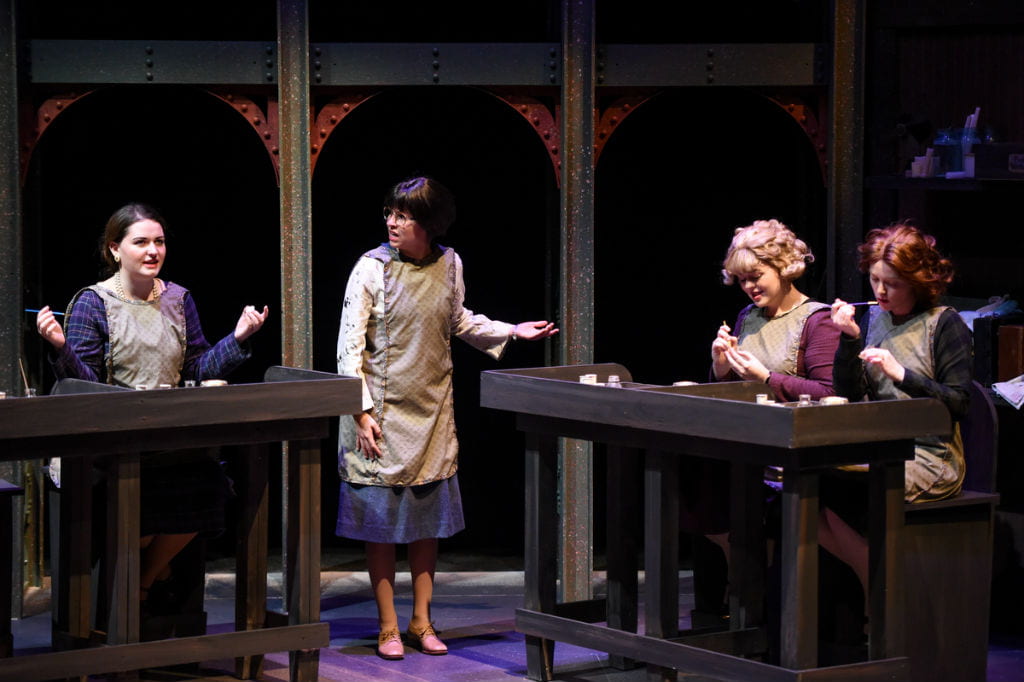BY SHRUTI RAM – STAFF WRITER
DramaCentre set the bar high for theatrical productions this semester with a visually stunning Moby Dick, and an immersive student-run production of Dracula, so expectations were high for the fall play, Melanie Marnich’s These Shining Lives. The production, which ran Nov. 11-14, surpassed these high expectations by far, and left audiences with tear-rimmed eyes and thoughtful silence.
The play is set in the late 1920s and 1930s where Radium Dial, a watch-making company, is bucking the trend and paying women to work by painting hour markings on glow-in-the-dark watch dials with radium; however, their workers are never told how harmful radium is, and all suffer from radium poisoning. Faced with terminal illness, they file a lawsuit against Radium Dial and finally win after a grueling seven-year battle.
Not all Centre students knew what they were in for when the settled in to watch the play.
“I did not expect it to be as serious as it was,” junior Peyton Goodman said. “It was very emotional. There were moments where I was almost crying because it was such a serious topic. You feel awful for what those women had to go through.”
The principle narrator of the play is Catherine Donahue, played by senior Taylee Wells, who soon grows close to three other women working at the company—Charlotte, Francis and Pearl, played by senior Tory Parker, sophomore Rachel Kent, and first-year Katherine Moeykens, respectively.
As the women slowly realize their bodies are succumbing in different ways to something they do not understand, they have to draw strength from each other and from within themselves, to come to terms with the fact that they are victims of a business that considered their lives expendable. The women’s unique relationship is a powerful aspect of the play, and the actors portrayed this onstage friendship very well.
“I think my favorite scene was the beach scene, because it was before everything big happened and I felt I could relate to it in a lot of ways,” Goodman said. “I feel like I’m in a stage in my life where a lot of my friends and I are moving in different paths, and we hope that we will still stay together and be close years from now.”
While the relationship between the four women certainly made an impression, especially on girls that could relate to the close bond they hand, there was one character that seemed to be a clear favorite.

“I personally liked Charlotte,” sophomore Meg Reid said, referring to the fast-talking, norm-breaking smart-alec of the group.
“Tory [Parker]’s character Charlotte was my favorite,” Goodman said. “She had these moments where she was sassy and funny, and she was also serious and strong and supportive. And that hair, oh my gosh, that hair.”
While the relationships between the women were essential to what made the play a success, another important component was the relationship of Catherine (Wells) and her husband Tom, played by first-year Brennen Amonett.
“My favorite scene was Tom’s monologue; it was very moving,” junior Kortney Trevino said, referring to the scene where a tearful Tom Donahue confronts his wife’s employer and comes to terms with her impending death. By the time he uttered the words “I was supposed to grow old with that woman,” there wasn’t a single dry eye in the room.
“What I found really cool was that every single character in this play was a real person,” sophomore Annie Stewart said. Stewart spent the semester in the costume shop building costumes for the show, and worked backstage as a dresser during the run. “This really happened to them. We had at least one cast or crew member tear up every night, [even though] we collectively saw it more than six times each. We were moved just by words, because we couldn’t see the actors backstage.”
Whether you were in the audience or behind the scenes, it was clear that the actors embodied their roles so well that identities of the people playing them slowly melted away. Soon, we weren’t watching Amonett or Wells but crying at the words and experiences of Tom and Catherine as we moved through their story with them.
“They really internalized those roles and really brought you back to that time,” Reid said. “The women really felt like they were getting a place in the world, and men were romantic and loving and cared about women.”
It was clear that These Shining Lives was not a typical DramaCentre production. Students left Weisiger Theater unsure how they could return to their normal lives, feeling as though they had lost a good friend. These Shining Lives was an incredible example of how, even at a small liberal arts college and with productions with a cast made up largely of first-year students, there are performances that can deeply move you.
